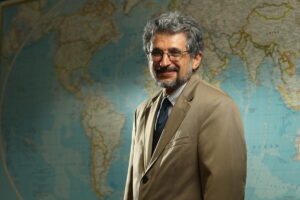Seligson, Centennial Professor of Political Science, emeritus, has died
 Mitchell A. Seligson, Centennial Professor of Political Science, professor of sociology, emeritus, and founder of the Latin American Public Opinion Project (LAPOP) Lab died June 1, 2024, in New York City. He was 78.
Mitchell A. Seligson, Centennial Professor of Political Science, professor of sociology, emeritus, and founder of the Latin American Public Opinion Project (LAPOP) Lab died June 1, 2024, in New York City. He was 78.
Born in 1945 in Hempstead, New York, Seligson developed an interest in Latin America after meeting a foreign exchange student from Mexico in high school. During the same time, he and a close friend became interested in addressing the challenge of world poverty. Initially believing that it was an agricultural problem, Seligson soon learned it was a political one, which drove his interest in political science.
Seligson earned a bachelor’s degree in political science from Brooklyn College in 1967 and a master’s degree in political science from the University of Florida in 1968. From 1968-1970, Seligson served as a U.S. Peace Corps volunteer in Costa Rica with his wife, Susan Berk-Seligson, Vanderbilt professor emerita of Spanish linguistics. Following that, he received his Ph.D. in political science from the University of Pittsburgh in 1974.
He held appointments at the University of Arizona, the University of Illinois at Chicago, and the University of Pittsburgh before joining Vanderbilt in 2004 as Centennial Professor of Political Science. Seligson was founding director of the LAPOP Lab at Vanderbilt. He retired in 2019 as professor emeritus.
Originating from a research program that Seligson founded in the 1970s, LAPOP is the premier academic institution carrying out surveys of public opinion about democracy and governance in the Americas. The lab’s highly influential AmericasBarometer project assesses individual attitudes, evaluations, and experiences, and the resulting reports are relied upon widely by policymakers, analysts, and other academics.
“As the founder and senior advisor of the Latin American Public Opinion Project (LAPOP), Mitch’s work with the AmericasBarometer surveys provided invaluable insights into the state of democracy across more than 27 countries, extending his impact globally,” said C. Cybele Raver, provost and vice chancellor for academic affairs. “His contributions will continue to shape the field and inspire future scholars.”
Seligson’s influence on Latin American studies extend beyond LAPOP: he was a member of various organizations, including the General Assembly of the Inter-American Institute of Human Rights and the Advisory Board for the Organization of American States (OAS) Inter-American Program on Education for Democratic Values and Practices.
“Mitch was an outstanding scholar and teacher and had a transformative influence on the College of Arts and Science and the university through his leadership of LAPOP,” said Tim McNamara, dean of the College of Arts and Science. “Mitch was also a valued colleague and wonderful person. We will miss him greatly.”
Seligson received various fellowships and grants for his research from organizations such as the Rockefeller Foundation, Ford Foundation, National Science Foundation, Mellon Foundation, Howard Heinz Foundation, U.S. Department of Education, and U.S. Agency for International Development.
He published over 140 articles, 14 books, and more than 35 monographs and occasional papers. He was a founding member of the International Advisory Board (IAB) of the AfroBarometer, and he served on the editorial boards of the European Political Science Review (Cambridge University Press), Comparative Political Studies, the Journal of Democracy en Español, ROP: Revista Opinião Pública, the Political Analysis series, Palgrave Macmillan, Estudios Interdisciplinarios de América Latina y el Caribe, and the Delaware Review of Latin American Studies (DeRLAS).
Seligson received numerous awards throughout his career, including the Best Paper Award (Pi Sigma Alpha) at the Annual Meeting of the Southwestern Political Science Association (1982); the Hoover Institution Annual Prize for the Best Scholarly Article on Latin America (1984); the James A. Robertson Memorial Prize for the best paper in Latin American history (1995); the Foreign Policy en Espanol Best 25 Books in Global Relations award (2008); Vanderbilt’s Alexander Heard Distinguished Service Professor Award (2016); and the Lijphart/Przeworski/Verba Data Set Award (2018).
“In transforming survey research in the Latin America and Caribbean region, Mitch brought local voices to the forefront of discussions about public opinion and democracy,” said Elizabeth Zechmeister, director of LAPOP and Cornelius Vanderbilt Chair of Political Science. “Mitch was a one-of-a-kind scholar—he innovatively advanced the frontier of research and dialogue on public opinion and democracy, while he simultaneously empowered students, colleagues, development practitioners, and individuals across the Americas to do the same.”
“Mitch was an amazing person and colleague, and his passion for his work was completely infectious,” said Alan Wiseman, Cornelius Vanderbilt Chair of Political Economy and chair of the Department of Political Science. “The scope of Mitch’s contributions to our department and the broader Vanderbilt community cannot be overstated. He is one of the main reasons that we are who we are today, and he has left a lasting legacy in the political science community.”
Seligson is survived by his wife of 56 years, Susan, daughter Amber Levanon Seligson, son-in-law Gad Levanon, and three grandchildren—Maya, Dalia, and Tamar.
Private services were held at the Plaza Jewish Community Chapel in New York on Monday, June 3, 2024. Additional remembrances are being planned by Vanderbilt and LAPOP.
